- Home
- Ian Fleming
Bond 12 - You Only Live Twice Page 9
Bond 12 - You Only Live Twice Read online
Page 9
Despite his height, Bond merged quite adequately into the bustling, shoving crowd of passengers. His ‘disguise’ had mysteriously appeared in his room at the bathhouse and Mariko had greatly enjoyed dressing him up. ‘Now Japanese gentleman,’ she had said approvingly as, with a last lingering kiss, she had gone to answer Tiger’s rap on the partition. Bond’s own clothes and possessions had already been taken away.
‘They and your things from the hotel will be transferred to Dikko’s apartment,’ Tiger had said. ‘Later today, Dikko will inform your Chief that you have left Tokyo with me for a visit to the MAGIC establishment, which is, in fact, a day’s journey from Tokyo, and that you will be away for several days. Dikko believes that this is so. My own department merely know that I shall be absent on a mission to Fukuoka. They do not know that you are accompanying me. And now we will take the express to Gamagori on the south coast and the evening hydrofoil across Ise Bay to the fishing port of Toba. There we will spend the night. This is to be a slow journey to Fukuoka for the purpose of training and educating you. It is necessary that I make you familiar with Japanese customs and folkways so that you make as few mistakes as possible – when the time comes.’
The gleaming orange and silver express slid to a stop beside them. Tiger barged his way on board. Bond waited politely for two or three women to precede him. When he sat down beside Tiger, Tiger hissed angrily, ‘First lesson, Bondo-san! Do not make way for women. Push them, trample them down. Women have no priority in this country. You may be polite to very old men, but to no one else. Is that understood?’
‘Yes, master,’ said Bond sarcastically.
‘And do not make Western-style jokes while you are my pupil. We are engaged on a serious mission.’
‘Oh, all right, Tiger,’ said Bond resignedly. ‘But damn it all ...’
Tiger held up a hand. ‘And that is another thing. No swearing, please. There are no swear-words in the Japanese language and the usage of bad language does not exist.’
‘But good heavens, Tiger! No self-respecting man could get through the day without his battery of four-letter words to cope with the roughage of life and let off steam. If you’re late for a vital appointment with your superiors, and you find that you’ve left all your papers at home, surely you say, well, Freddie Uncle Charlie Katie, if I may put it so as not to offend.’
‘No,’ said Tiger. ‘I would say “Shimata”, which means “I have made a mistake”. ’
‘Nothing worse?’
‘There is nothing worse to say.’
‘Well, supposing it was your driver’s fault that the papers had been forgotten. Wouldn’t you curse him backwards and sideways?’
‘If I wanted to get myself a new driver, I might conceivably call him “bakyaro” which means a “bloody fool”, or even “konchikisho” which means “you animal”. But these are deadly insults and he would be within his rights to strike me. He would certainly get out of the car and walk away.’
‘And those are the worst words in the Japanese language! What about your taboos? The Emperor, your ancestors, all these gods? Don’t you ever wish them in hell, or worse?’
‘No. That would have no meaning.’
‘Well then, dirty words. Sex words?’
‘There are two–“chimbo” which is masculine and “monko” which is feminine. These are nothing but coarse anatomical descriptions. They have no meaning as swearing words. There are no such things in our language.’
‘Well I’m ... I mean, well I’m astonished. A violent people without a violent language! I must write a learned paper on this. No wonder you have nothing left but to commit suicide when you fail an exam, or cut your girl friend’s head off when she annoys you.’
Tiger laughed. ‘We generally push them under trams or trains.’
‘Well, for my money, you’d do much better to say “You —”,’ Bond fired off the hackneyed string, ‘and get it off your chest that way.’
‘That is enough, Bondo-san,’ said Tiger patiently. ‘The subject is now closed. But you will kindly refrain both from using these words or looking them. Be calm, stoical, impassive. Do not show anger. Smile at misfortune. If you sprain your ankle, laugh.’
‘Tiger, you’re a cruel taskmaster.’
Tiger grinned with satisfaction. ‘Bondo-san, you don’t know the half of it. But now let us go and get something to eat and drink in the buffet car. All that Suntory you forced on me last night is crying out for the skin of the dog that bit me.’
‘The hair,’ corrected Bond.
‘One hair would not be enough, Bondo-san. I need the whole skin.’
James Bond wrestled with his chopsticks and slivers of raw octopus and a mound of rice (‘You must get accustomed to the specialities of the country, Bondo-san’) and watched the jagged coastline, interspersed with glittering paddy-fields, flash by. He was lost in thought when he felt a hard jostle from behind. He had been constantly jostled as he sat up at the counter – the Japanese are great jostlers – but he now turned and caught a glimpse of the stocky back of a man disappearing into the next compartment. There were white strings round his ears which showed that he was wearing a masko, and he wore an ugly black leather hat. When they went back to their seat Bond found that his pocket had been picked. His wallet was gone. Tiger was astonished. ‘That is very unusual in Japan,’ he said defensively. ‘But no matter. I will get you another at Toba. It would be a mistake to call the conductor. We do not wish to draw attention to ourselves. The police would be sent for at the next station and there would be much interrogation and filling out of forms. And there is no way of finding the thief. The man will have pocketed his masko and hat and will be unrecognizable. I regret the incident, Bondo-san. I hope you will forget it.’
‘Of course. It’s nothing.’
They left the train at Gamagori, a pretty seaside village with a humped island in the bay that Tiger said housed an important shrine, and the fifty-knot ride in the hydrofoil to Toba, an hour away across the bay, was exhilarating. As they disembarked, Bond caught a glimpse of a stocky silhouette in the crowd. Could it be the thief on the train? But the man wore heavy horn-rimmed spectacles, and there were many other stocky men in the crowd. Bond dismissed the thought and followed Tiger along the narrow streets, gaily hung with paper banners and lanterns, to the usual discreet frontage and dwarf pines that he had become accustomed to. They were expected and were greeted with deference. Bond had had about enough of the day. There weren’t many bows and smiles left in him, and he was glad when he was at last left alone in his maddeningly dainty room with the usual dainty pot of tea, dainty cup and dainty sweetmeat wrapped in rice-paper. He sat at the open partition that gave on to a handkerchief of garden and then the sea wall and gazed gloomily across the water at a giant statue of a man in a bowler hat and morning coat that Tiger had told him was Mr Mikimoto, founder of the cultured pearl industry, who had been born at Toba and had there, as a poor fisherman, invented the trick of inserting grains of sand under the mantle of a live oyster to form the kernel of a pearl. Bond thought, To hell with Tiger and his crazy plan. What in God’s name have I got myself into? He was still sitting there cursing his lot when Tiger came in and brusquely ordered him to don one of the yukatas that hung with the bedding in the single cupboard in the paper wall.
‘You really must concentrate, Bondo-san,’ said Tiger mildly. ‘But you are making progress. As a reward I have ordered saké to be brought in large quantities and then a dinner of the speciality of this place, lobster.’
Bond’s spirits rose minutely. He undressed to his pants, donned the dark-brown yukata (‘Stop!’ from Tiger. ‘Wrap it round to the right! Only a corpse wraps it round to the left.’) and adopted the lotus position across the low table from Tiger. He had to admit that the kimono was airy and comfortable. He bowed low. ‘That sounds a most sincere programme. Now then, Tiger. Tell me about the time you were training as a kami-kaze. Every detail. What was it all about?’
The saké came. The pretty w
aitress knelt on the tatami and served them both. Tiger had been thoughtful. He had ordered tumblers. Bond swallowed his at one gulp. Tiger said, ‘The grossness of your drinking habits fits well with your future identity.’
‘And what is that to be?’
‘A coalminer from Fukuoka. There are many tall men in that profession. Your hands are not rough enough, but you pushed a truck underground. Your nails will be filled with coal dust when the time comes. You were too stupid to wield a pick. You are deaf and dumb. Here,’ Tiger slipped across a scrubby card, creased and dog-eared. There were some Japanese characters on it. ‘That is “Tsumbo de oshi”–deaf and dumb. Your disability will inspire pity and some distaste. If someone talks to you, show that and they will desist. They may also give you a few pieces of small coin. Accept them and bow deeply.’
‘Thanks very much. And I suppose I have to account for these tips to your secret fund?’
‘That will not be necessary.’ Tiger was wooden-faced. ‘Our expenses on this mission are a direct charge on the Prime Minister’s purse.’
Bond bowed. ‘I am honoured.’ He straightened himself. ‘And now, you old bastard. More saké and tell me about the kami-kaze. In due course I am prepared to become a deaf and dumb miner from Fukuoka. In public I am prepared to hiss and bow with the best of them. But, by God, when we’re alone, the password is Freddie Uncle Charlie Katie or I’ll be putting my head under a pile-driver before you get me on to the first tee. Is that agreed?’
Tiger bowed low. ‘Shimata! I am in error. I have been pressing you hard. It is my duty to entertain a friend as well as instruct a pupil. Lift your glass, Bondo-san. Until you do so the girl will not pour. Right. Now you ask me about the kami-kaze.’ Tiger rocked backwards and forwards and his dark, assassin’s eyes became introspective. He didn’t look up at Bond. He said, ‘It was nearly twenty years ago. Things were looking bad for my country. I had been doing intelligence work in Berlin and Rome. I had been far from the air raids and even farther from the front line, and every night when I listened to the radio from my homeland and heard the bad news of the slow but sure approach of the American forces, island by island, airstrip by airstrip, I paid no attention to the false news of the Nazis, but thought only that my country was in danger and that I was needed to defend it.’ Tiger paused. ‘And the wine turned sour in my mouth and the girls turned cold in my bed. I listened to the accounts of this brilliant invention, the corps of kami-kaze. That is the “Divine Wind” that saved my country from invasion by Kublai Khan in the thirteenth century by destroying his fleet. I said to myself that that was the way to die – no medals, total death, suicide if you like, but at enormous cost to the enemy. It seemed to me the most heroic form of personal combat that had ever been invented. I was nearly forty. I had lived fully. It seemed to me that I could take the place of a younger man. The technique was simple. Anyone can learn to pilot a plane. The escorts of fighter planes led in to the attack. It was then just a question of aiming yourself at the largest ship, preferably an aircraft carrier that was bringing planes to the islands to attack the homeland. You got the ship lined up below you and you went for the flight deck and the lift which is the heart of a carrier. Pay no attention to the bridge or the water line. They are heavily armoured. Go for the vulnerable machinery of the flight deck. You understand?’
Tiger was completely sent. He was back there again fighting the war. Bond knew the symptoms. He often visited this haunted forest of memory himself. He lifted his glass. The kneeling girl bowed and poured. Bond said, ‘Yes. Go on, Tiger.’
‘I forced the Kempeitai to accept my resignation and I returned to Japan and more or less bribed my way into a kami-kaze training squadron. They were very difficult to get into. All the youth of the nation seemed to want to serve the Emperor in this way. At this time we were running out of aircraft and we were forced to use the more difficult baku–that was a small plane made mostly of wood with a thousand pounds of explosive in the nose, a kind of flying bomb. It had no engine, but was released from below the belly of a fighter bomber. The pilot had a single joystick for controlling direction.’ Tiger looked up. ‘I can tell you, Bondo-san, that it was a terrible and beautiful thing to see an attack wave going off. These young men in their pure white shifts, and with the ancient white scarf that was the badge of the samurai bound round their heads, running joyfully for their planes as if they were running to embrace a loved one. The roar of the engines of the mother planes, and then the take-off into the dawn or into the setting sun towards some distant target that had been reported by spies or intercepted on the radio. It was as if they were flying to their ancestors in heaven, as indeed they were, for of course none ever came back or were captured.’
‘But what did it all achieve? Of course it frightened the American fleet all right, and the British. But you lost thousands of your best young men. Was it worth it?’
‘Is it worth writing one of the most glorious pages in your country’s history? Do you know that the kami-kaze is the only unit in the history of air warfare whose claims were less than the truth? The unit claimed as sunk or damaged 276 naval craft from aircraft carriers downwards. Those actually sunk or damaged were 322.’
‘You were lucky the surrender came before you were sent on a mission.’
‘Perhaps. And yet, Bondo-san, it is one of my most cherished dreams today to come diving out of the sun into a hail of anti-aircraft fire, see the tiny, terrified figures running for shelter from the flight deck of a wildly swerving carrier and know that you are about to kill a hundred or more of the enemy and destroy a million pounds’ worth of his fighting machine, all by yourself.’
‘And I suppose Admiral Ohnishi, who invented the whole idea, committed suicide when the surrender came?’
‘Naturally. And in a most honourable fashion. When you commit seppuku you invite two of your best friends to be present to finish you off if you fail. The Admiral executed the cross-cut from left to right of the belly, and then the upward cut to the breast bone, most admirably. But it did not kill him. Yet he refused the coup de grâce. He sat there contemplating his insides for a whole day before he finally died. A most sincere gesture of apology to the Emperor.’ Tiger waved a hand airily. ‘However, I must not spoil your dinner. I can see that some of our honourable customs offend your soft Western susceptibilities. Here comes the lobster. Are they not splendid animals?’
Lacquer boxes of rice, raw quails’ eggs in sauce and bowls of sliced seaweed were placed in front of them both. Then they were each given a fine oval dish bearing a large lobster whose head and tail had been left as a dainty ornament to the sliced pink flesh in the centre. Bond set to with his chopsticks. He was surprised to find that the flesh was raw. He was even more surprised when the head of his lobster began moving off his dish and, with questing antennae and scrabbling feet, tottered off across the table. ‘Good God, Tiger!’ Bond said, aghast. ‘The damn thing’s alive!’
Tiger hissed impatiently, ‘Really, Bondo-san. I am much disappointed in you. You fail test after test. I sincerely hope you will show improvement during the rest of our journey. Now eat up and stop being squeamish. This is a very great Japanese delicacy.’
James Bond bowed ironically. ‘Shimata!’ he said. ‘I have made a mistake. It crossed my mind that honourable Japanese lobster might not like being eaten alive. Thank you for correcting the unworthy thought.’
‘You will soon become accustomed to the Japanese way of life,’ said Tiger graciously.
‘It’s their way of death that’s got me a little bit puzzled,’ said Bond amiably, and he handed his glass to the kneeling waitress for more saké to give him strength to try the seaweed.
10 ....... ADVANCED STUDIES
TIGER AND Bond stood in the shade of the avenue of giant cryptomerias and observed the pilgrims, slung with cameras, who were visiting the famous Outer Shrine of Ise, the greatest temple to the creed of Shintoism. Tiger said, ‘All right. You have observed these people and their actions. They have been sayi
ng prayers to the sun goddess. Go and say a prayer without drawing attention to yourself.’
Bond walked over the raked path and through the great wooden archway and joined the throng in front of the shrine. Two priests, bizarre in their red kimonos and black helmets, were watching. Bond bowed towards the shrine, tossed a coin on to the wire-netting designed to catch the offerings, clapped his hands loudly, bent his head in an attitude of prayer, clapped his hands again, bowed and walked out.
‘You did well,’ said Tiger. ‘One of the priests barely glanced at you. The public paid no attention. You should perhaps have clapped your hands more loudly. It is to draw the attention of the goddess and your ancestors to your presence at the shrine. Then they will pay more attention to your prayer. What prayer did you in fact make?’
‘I’m afraid I didn’t make any, Tiger. I was concentrating on remembering the right sequence of motions.’
‘The goddess will have noted that, Bondo-san. She will help you to concentrate still more in the future. Now we will go back to the car and proceed to witness another interesting ceremony in which you will take part.’

 Doctor No
Doctor No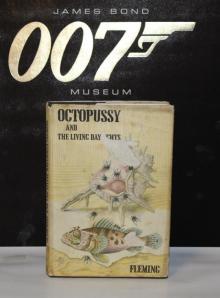 Octopussy & the Living Daylights
Octopussy & the Living Daylights On Her Majestys Secret Service
On Her Majestys Secret Service You Only Live Twice
You Only Live Twice From Russia With Love
From Russia With Love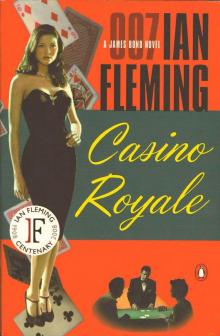 Casino Royale
Casino Royale Thunderball
Thunderball For Your Eyes Only
For Your Eyes Only Goldfinger
Goldfinger The Man With the Golden Gun
The Man With the Golden Gun The Spy Who Loved Me
The Spy Who Loved Me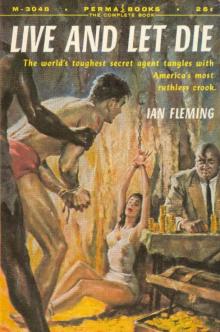 Live and Let Die
Live and Let Die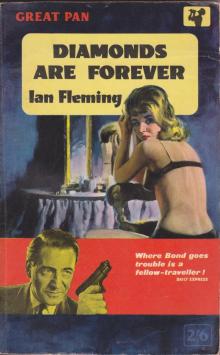 Diamonds Are Forever
Diamonds Are Forever Moonraker
Moonraker The James Bond MEGAPACK®
The James Bond MEGAPACK® Bond 10 - The Spy Who Loved Me
Bond 10 - The Spy Who Loved Me From Russia with Love (James Bond - Extended Series Book 5)
From Russia with Love (James Bond - Extended Series Book 5)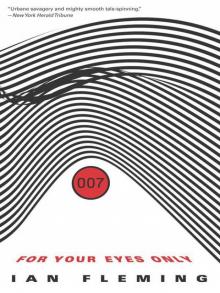 Bond 08 - For Your Eyes Only
Bond 08 - For Your Eyes Only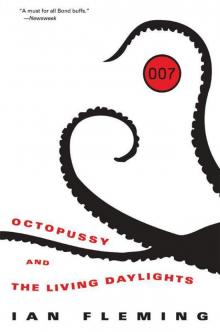 Bond 14 - Octopussy and the Living Daylights
Bond 14 - Octopussy and the Living Daylights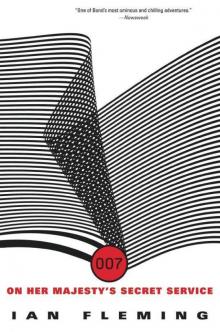 Bond 11 - On Her Majesty's Secret Service
Bond 11 - On Her Majesty's Secret Service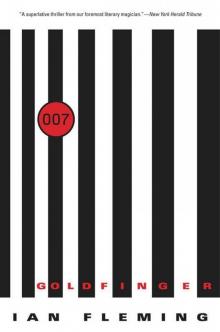 Bond 07 - Goldfinger
Bond 07 - Goldfinger Bond 12 - You Only Live Twice
Bond 12 - You Only Live Twice Bond 09 - Thunderball
Bond 09 - Thunderball Bond 01 - Casino Royale
Bond 01 - Casino Royale Diamonds are Forever (James Bond - Extended Series Book 4)
Diamonds are Forever (James Bond - Extended Series Book 4) Bond 06 - Dr. No
Bond 06 - Dr. No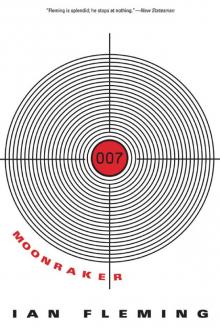 Moonraker (James Bond - Extended Series Book 3)
Moonraker (James Bond - Extended Series Book 3) Bond 05 - From Russia With Love
Bond 05 - From Russia With Love Casino Royale (James Bond - Extended Series Book 1)
Casino Royale (James Bond - Extended Series Book 1)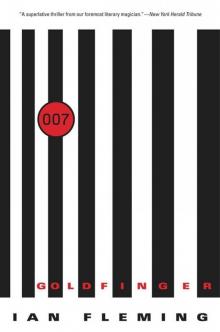 Goldfinger (James Bond - Extended Series Book 7)
Goldfinger (James Bond - Extended Series Book 7) Chitty Chitty Bang Bang: The Magical Car
Chitty Chitty Bang Bang: The Magical Car Bond 04 - Diamonds Are Forever
Bond 04 - Diamonds Are Forever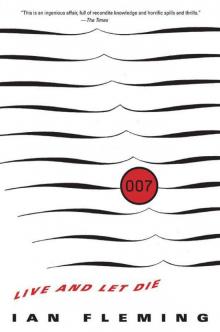 Bond 02 - Live and Let Die
Bond 02 - Live and Let Die Dr. No (James Bond - Extended Series Book 6)
Dr. No (James Bond - Extended Series Book 6) The Hildebrandt rarity
The Hildebrandt rarity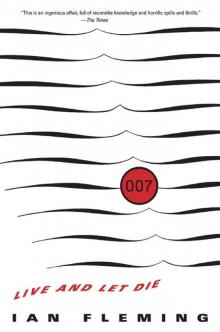 Live and Let Die (James Bond - Extended Series Book 2)
Live and Let Die (James Bond - Extended Series Book 2) Chitty Chitty Bang Bang
Chitty Chitty Bang Bang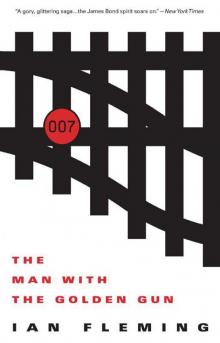 Bond 13 - The Man With the Golden Gun
Bond 13 - The Man With the Golden Gun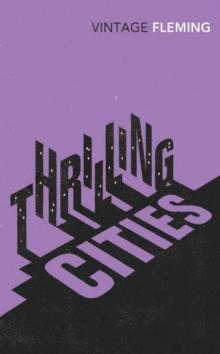 Thrilling Cities
Thrilling Cities Bond 03 - Moonraker
Bond 03 - Moonraker